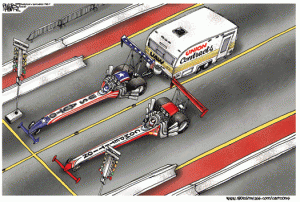UPDATE: More from Mickey Kausabout the bailout situation. This may not fly as the public is wise to it. At least 64% of them are.
There was considerable discussion about Obama appointing a “car czar” to solve the problems of the Big Three auto makers. That has now been cancelled. Why ? This might explain it.
President Barack Obama announced Monday that he will appoint, not a “car czar,” but a “Presidential Task Force for Autos” to “fix” the Detroit Three. The task force will headed by Treasury Secretary Tim Geithner, but it is the first name appointed by Geithner — “Senior Advisor” Ron Bloom — is of real interest for a number of reasons.
Ron Bloom is the UAW’s man in the administration. The only chance to solve the Big Three’s problems is bankruptcy. Not only are their union contracts too expensive, the work rules and other adversarial factors in the relationship will prevent the auto makers from restructuring and becoming competitive once again.
Bloom (and Keilin) made their reputation battling steel companies which, burdened by excessive union costs, suffered through a very similar experience to the Detroit Three thirty years ago. In fact, as the New York Times’s David Streitfeld points out in this superb article, five U.S. steel companies received over $300 million in bailout loans from the Carter Administration in the 1970s.
They still ended up in bankruptcy but, in the meantime, the unions had extracted millions in additional money from the taxpayer. Mickey Kaus knows what the problem is but Obama isn’t interested. This will be another boondoggle and will cost millions, if not billions.
But what’s a billion between friends ?
